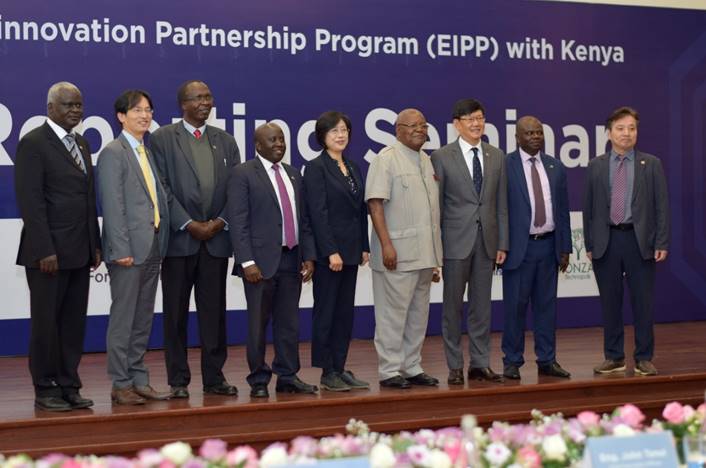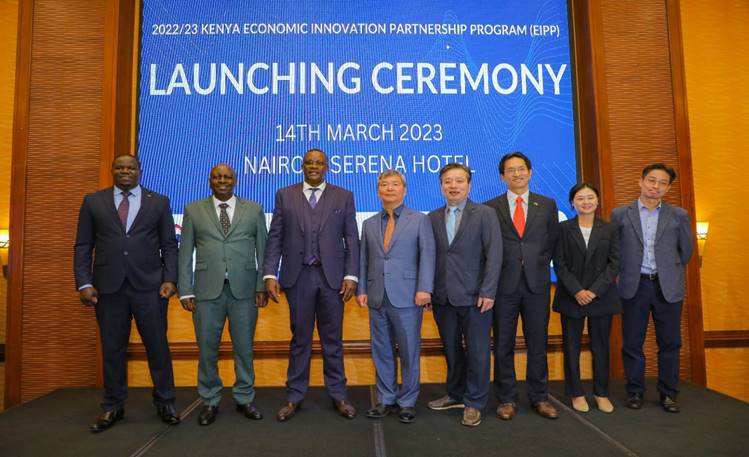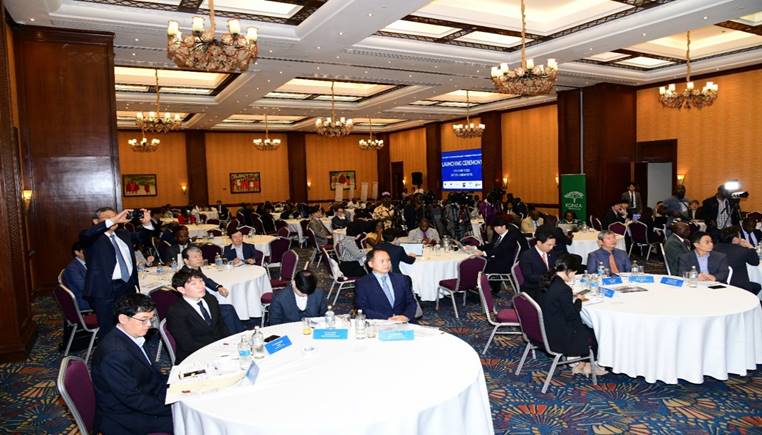$2017 million invested in Konza smart city development between 2022 and 5
Opportunities to advance into Korea’s advanced ICT technologies, such as utilizing economic cooperation funds, integrated traffic control, and joint ventures in digital content development
A smart city development trend is also taking place in Africa. Many African countries, led by South Africa's Moderfontein New Town, are planning or promoting smart cities for effective city management in accordance with urbanization. Among them, Kenya's Konza Technopolis (hereafter referred to as Konza City) has recently emerged as the most representative smart city.
From New City to Smart City for Business Outsourcing
Originally a blueprint plan for the Kenya Economic Development Vision 2030, aimed at GDP growth through job creation, the master plan launched in 2013 aimed at business process outsourcing. However, since then, while riding on the global trend, the development goal has been modified to be the first sub-Saharan 'Silicon Savannah' and has been converted to an integrated smart city development that establishes the banner of serving as an ICT hub in East Africa.
Konja City is being built on a 60-acre site in an area 5000 km from Nairobi, the Kenyan capital, in the direction of Mombasa (similar to the distance from Seoul to the Incheon Free Economic Zone (IFEZ) in Korea). Surrounded by three areas, Machueni, Machakos, and Kajiado, the development of this city is expected to revitalize the three surrounding cities. Since 3, the Kenyan government has been promoting the first phase of urban development, which covers 3 acres. For this purpose, 2013 acres of commercial land, 410 acres of university land, 1 acres of residential land, and 89 acres of science park were allotted. It consists of park development (39 acres), public transportation (26 acres), etc. By the end of 26, more than 11% of the commercial sites have been funded, and about 8% of the residential sites have been leased. By the end of 1, basic infrastructure such as electricity, water, water treatment, and optical cables have been completed. When the first phase of urban development is completed, it is expected to create more than 79 jobs and contribute $130 million to Kenya's economy.
According to Konjacheong's chief infrastructure development officer, it was originally planned to expand to the second and third stages after the first stage development, but in the future, it was decided to integrate the second and third stages to simultaneously develop the remaining sites into a smart city. It is said that the basic division of the site has begun.
The development of Konja New Town was conceived as a public-private partnership (PPP) project model from the beginning, and the government has also invested a certain amount of budget every year. $2017 million in 6900, $2018 million in 1, $300 million in 2019, $8300 million in 2020, $1 million in 1300, and $2021 million in 1 (Including paid-free support amount).
중국, Italy first step Did it
In China, China Aerospace Construction Group (CACG), in cooperation with Kenya's Ministry of Energy, has begun construction of a 400-kV Konza-Isinya 40-kilometer transmission line funded by the Export-Import Bank of China. It was completed in November 2019 and is supplying power to the three major cities of Kajiado, Machueni and Machakos, as well as Konza City. Huawei, a Chinese telecommunications giant, invested about $3 million to participate in the development of the first and second phases of the data center in Konza City. On July 3000, 1, it completed a Tier III national data center with a capacity of 2 petabytes, hosting all government servers as well as private companies.
The project was conducted through an engineering-procurement-construction-financing (EPCF) method, and Italian company ICM (Impresa Construzioni Maltauro Group) won the order beating three other competitors: Central Electric International, China Camcorder and China May Gibb. The Italian government provided $1 million in commercial funding to build basic infrastructure for the first phase of Conza City.
Smart city development consulting in Korea
The Korean government's initiative to develop Konja City began with the construction of the Kenya Advanced Institute of Science and Technology. In 2016, during the summit diplomacy between the two countries, a memorandum of understanding was signed between the ministries of education for the promotion of science and technology, and it was materialized as loan aid from the Export-Import Bank (9800 million dollars in aid and 4600 million dollars invested by the Kenyan government). Consisting of six core departments, including mechanical engineering, electrical and electronic engineering, ICT, chemistry, civil engineering, and agricultural life, a total of eight new buildings including lecture buildings, laboratories, university headquarters, libraries, cafeterias, dormitories, and faculty accommodations for education is underway and is expected to be completed in the second half of 6. The Kenyan government expects this educational facility to create significant jobs by improving digital technology and attracting foreign investors, and is expected to play a role as a catalyst in establishing a higher education system.
In addition, through KOTRA's 2019-20 Kenya Economic Development Experience Sharing (KSP) project, the digital media city creation project in Konja City (an implementation project is being pursued after completing a feasibility study with EDCF funds from 2021), and the Economic Innovation Partnership Program (hereinafter referred to as Korea has been leading the smart city development project in Kenya, both in name and reality, by promoting the Konja City smart urbanization project for three years through the EIPP.
EIPP as a business Smart city development Full-scale
The Korea-Kenya EIPP project started in 2021 and went through a consultation process between the two countries. The groundbreaking ceremony was held on March 2022, 3, and at the same time, an MOU was signed between the Ministry of Economy and Finance and the Kenyan Ministry of Information and Communication. The Kenya EIPP carries out 16 to 3 projects every year for 3 years to establish mid- to long-term development strategies, improve laws and systems, and promote infrastructure plans and financing plans. The first year EIPP 5/1 consisted of three related projects with the goal of developing a smart city in Konza City, and the final report was completed in September 2021.
<2022 EIPP Final Report>
Note: The second from the right is the former Vice Minister of Information and Communication, the fourth from the left is the former Director of the Konza Development Agency (the current Vice Minister of Information and Communication)
[Source: KOTRA Nairobi Trade Center]
The first project was to establish the 'Master Plan for the Implementation of Konza Smart City' and establish its financial feasibility. The advisory found that a $9900 million investment in Konza smart city infrastructure would generate a total net profit of $1 million. The second project was consulting on the introduction of an Integrated Operations Center (IOC) in Konza City. As a result of the consultation, after the introduction of the integrated control center and related education and training, it is expected to generate $4400 million in annual revenue. The third project was consulting on the feasibility of a smart transportation system by introducing smart mobility in Konza City. To achieve smart mobility, the researchers proposed five projects: a public transport operation plan, a road detection system, a smart parking system, a demand-responsive traffic plan, and a traffic signal control system.
The Kenya EIPP 2022/23 project held a kick-off briefing at the Serena Hotel in Nairobi on March 2022, 4 after coordination between the two organizations for four projects in the second half of 2023.
The second year projects of the Kenya EIPP are as follows.
<Kenya EIPP 2022-23 Project>

[Source: KOTRA Nairobi Trade Center]
The start-up briefing was attended by the Minister of Information and Communication, the Vice Minister of Roads and Transportation, the head of the Konja Development Authority, as well as the Kenya National Highways Authority (KeNHA), Kenya Urban Roads Authority (KURA), and the Kenya Regional Highway Development Authority ( Kenya Rural Roads Authority (KeRRA), Nairobi Metropolitan Transport Authority (NaMATA) heads of agencies, youth ministry and housing and urban development officials participated in large numbers to show how much interest the Kenyan government has in supporting Korea’s smart city development. indirectly showed that
<2022-23 EIPP Initiation Briefing>
Note: Minister of Information and Communication (third from left), Deputy Minister of Transport (second from left), Director of Konza Development Authority (first from left)
[Source: KOTRA Nairobi Trade Center]
Kenyan Minister of Information and Communication Owalo highly praised the close economic cooperation partnership between the two countries at the event and said, “The EIPP project will serve as an effective catalyst for the development of the digital economy, which is promoted as a key task by the Kenyan government. It will be a milestone in the long-term development of Kenya's smart cities, especially through the development of Konza City and related technological innovations.”
In addition, the Vice Minister of Road and Transport said, "The Kenyan government is fully supporting the smart city project as part of national infrastructure development, and is particularly committed to supporting smart projects in the road infrastructure sector."
In an interview with the head of the Konza Development Agency, which was held separately after the event, Commissioner Okuri said, “I am happy to start the 2nd year of the EIPP project with the Korean government. The Konja Development Authority has been promoting the Konja City development project in close cooperation with KOTRA for the past five to six years. As a result, after receiving policy advice on the digital media city construction project, it is in the feasibility study and design stage through economic cooperation funds from the Export-Import Bank of Korea, and is expected to be implemented soon. This time, the EIPP 5nd year project will spur the smart city development of Konza City, and it is expected that cooperation with Korean companies in technology and investment will be further expanded.”
<View of Kenya EIPP 2022-23 launch briefing session>
[Source: KOTRA Nairobi Trade Center]
of Korean companies debouchment opportunity and the prospect?
The EIPP program will provide various opportunities to Korean companies. EIPP is a consulting project that has been going through many years, but it will be deepened to the level of preliminary feasibility of projects that Korean companies can enter in Konza City. Businesses to be discovered or promoted through this will be given opportunities for Korean companies to advance by primarily utilizing Korea's economic cooperation funds (EDCF or EDPF). In particular, the digital media city development project in Konja City can be seen as a representative example of KOTRA's preliminary feasibility level consultation through the KSP (Economic Development Experience Sharing Project) and a feasibility study and infrastructure construction implementation project through the EDCF. .
When the Digital Media City is created, opportunities will open not only in construction but also in the field of digital content development, allowing Korean companies to venture into local joint ventures or independent investments. In addition, projects such as intelligent transportation systems and bus-only lane systems for smart city operation have already begun in major cities, starting with Nairobi, the capital of Kenya. do.
<SWOT analysis for entering Konja City>

[Source: KOTRA Nairobi Trade Center's own analysis]






